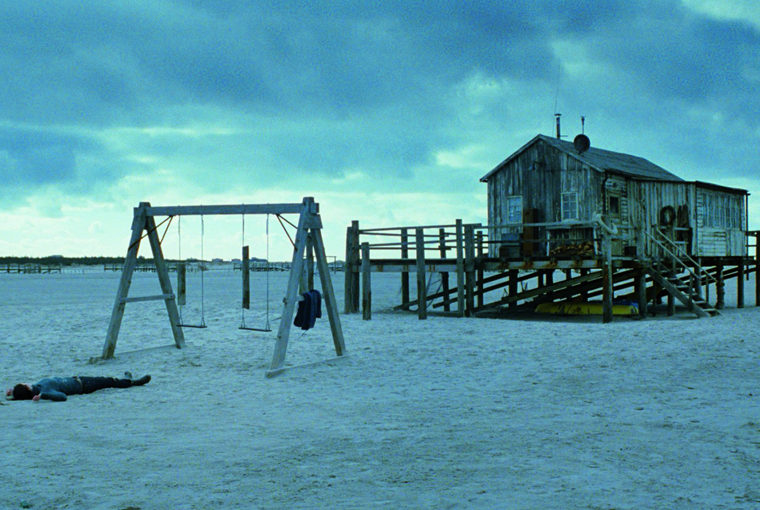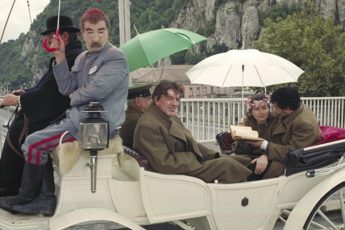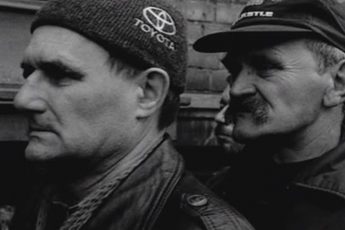
If there’s a director whom you’d call “experimental” in today’s world, it’s Benedek Fliegauf. Of the five feature films he has shot, none are equal in style or content (beyond some parallels, which I touch on below), and none are classical genre films. Dealer, which Moritz Pfeifer discusses in this journal, is telling in its stylistic defiance: here, drug dealing not only takes place exclusively during the day; the dealer is, in spite of his profession, rather likeable, while drug dealing is depicted as intuitive denial of our terrible world, i.e. Everyman’s existentialism. Womb, his second-latest and only English film, is in many ways his least experimental one, although it, too, merges genres (romantic drama, family drama, relationship drama) rather than subscribing to a particular one. It revolves around Rebecca, a young woman (ageing not apparent) who tries to cope with the death of her boyfriend/first love/lover by giving birth to his clone. If this seems like an abrupt introduction, rest assured that it reflects Fliegauf’s approach: after 30 minutes, he skillfully (and believably) integrates clones and genetic incest into his remote setting which would otherwise pretty much pass as today’s world. To that point, we are introduced to Rebecca and Thomas, friends in their childhood and lovers when Rebecca returns from Japan years later (Rebecca’s body is the real setting of this film on a whole lot of levels). Now, as their ephemeral post-Japan affair ends with Thomas’ death (car accident), we are confronted with Rebecca’s grief, and soon enough, her decision to give birth to another Thomas.
There are many questions which arise as one watches Rebecca raise her son, none of which are sufficiently answered: why would she want to give birth to the clone herself (this is not a must, we learn); how can she conceal it from neighbors and Thomas’ parents for so long; how can she be attracted to her son; why does she let him sleep with another woman if her masterplan is to end up with him; does Fliegauf believe that genetics entail a predisposition for liking a particular person etc. On the other hand, Fliegauf doesn’t give the impression that he’s trying to raise, let alone answer questions. The film reveres silence and observation, not philosophical contemplation. In my opinion, it is first and foremost supposed to entertain and shock, which is why I see its closest counterpart in David Lynch’s work, which I enjoy greatly, but the core or underlying meaning of which I don’t think can be made sense of (beyond the way that trivially, everything can be made sense of attributively).
If you ever happen to watch a Fliegauf film, observe how religious patience is not only expected from the audience (by today, a non-written rule in arthouse cinema), but continuously displayed by his characters: the dealer (Dealer) listens to all the high talk of his customers, exhibiting no intention to accelerate his departure; the two Romani children from Just the Wind appear to have no activities not immediately related to self-survival; in Womb, Thomas waits 12 years for Rebecca to return, and Rebecca 18+ for Thomas to grow up; in all three films, the day ultimately seems to consist of nothing but everyday activities like drinking, eating, and sleeping. Whether this double passivity (style & action) is good or bad is up to the indivual viewer to decide. Generally speaking, I’d say that a number of directors who have used such dramatic asceticism wisely (e.g. Chantal Akerman, Cristi Puiu) have set up the way for a growing amount of films which have made passivity an end in itself (it is noteworthy that Hollywood/mainstream cinema has seen a similar evolution with action); although, in Fliegauf’s defence, Just the Wind and Milky Way have, if somewhat excessively, shown that he, too, can use “non-time” more or less convincingly. Indeed, while festivals do feed a few star-charged (equally unimaginative) box office hits to the press, time moves so slowly in Berlin, Cannes and Venice that you begin wondering how the festival landscape can have the guts to call itself non-conformist. The problem is not that it is wrong to use one artistic language or another, but that we have began adulating artists for speaking a language which they have neither invented, nor perfected (unless of course we define perfecting as “the more, the better”).
Though frankly I have difficulties understanding most of Fliegauf’s characters, psychologically speaking, Rebecca’s behavior is especially curious, indeed trumping that of the greatest eccentrics of Fliegauf’s pedestrian universe (not curious as in mad, but matter-of-factly behaving in ways which the viewer is asked to accept). Her raging attraction to “Thommy”, for instance, survives maternity, morphing from (quasi)-pedophilia (the extent of her abuse isn’t fully analysed) to classical incestuous love, which, inevitably, is conceived in the end (and which, as if the viewer hasn’t suffered enough by now, is shown explicitly). But why expect psychological consistency if all the “logic” underlying Fliegauf’s film is one of psychoanalysis, not psychology; symbolism, not metaphoric insinuation; and shock, not provocation? Fliegauf’s film, as tasteless as this pun may be, can best be described as a miscarriage, born from pretentious confusion and confused pretension. This, I believe, is the downside of experimental filmmaking, where the longing for originality can trigger both avarice and blindness.




Leave a Comment